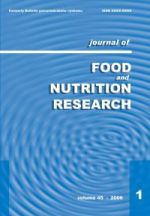Vedecký časopis - archív
Journal of Food and Nutrition Research
Súhrny čísla 3 / 2019
Szymelfejnik, E. – Jaroch, A. – Ameryk, M. – Balcerzak, W. –
Evaluation of the use of dietary supplements among first-grade primary school children from Poland in the context of the socioeconomic status of the family and children’s health status
Journal of Food and Nutrition Research, 58, 2019, č. 3, s. 255-265
Ewa Szymelfejnik, Department and Institute of Nutrition and Dietetics, Faculty of Health Sciences, Ludwik Rydygier Collegium Medicum in Bydgoszcz, Nicolaus Copernicus University in Toruń, 3 Dębowa Street, 85-626 Bydgoszcz, Poland. E-mail: e.szymelfejnik@cm.umk.pl
Received 28 August 2018; 1st revised 25 February 2019; 2nd revised 20 April 2019; accepted 17 May 2019; published online 23 August 2019
Súhrn: Taking dietary supplements without medical indications becomes frequent among children. The main aim of this study was to evaluate the prevalence of dietary supplementation among children attending first grade of primary school (
Kľúčové slová: school-aged children; dietary supplement; socioeconomic status; health status; level of education
Na stiahnutie:
jfnr201926.pdf (PDF, 285.48 Kb, 2934x)









